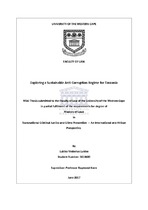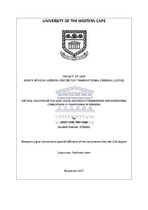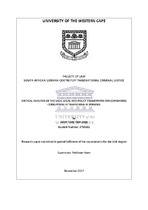Exploring a sustainable anti-corruption regime for Tanzania
Abstract
Corruption is among the world's devastating social, economic and political problems. It is
enormous to the extent that ''not one single country, anywhere in the world, is corruptionfree''.
Its effects on the quality of life of billions of people around the world are widely
acknowledged. Kofi Annan, former UN Secretary General, in his statement on the adoption
of the United Nations Convention against Corruption (UNCAC), proclaimed that:
Corruption is an insidious plague that has a wide range of corrosive effects on societies. It
undermines democracy and the rule of law, leads to violations of human rights, distorts
markets, erodes the quality of life, and allows organised crime, terrorism and other threats
to human security to flourish.
Corruption takes different forms depending on the time and the social, political and
economic circumstances that create avenues for its occurrence. Consequently, scholars
construe corruption from different viewpoints. On the one hand, post-colonialists and
Marxists perceive corruption as a product of capitalist pursuit of profit and capital
accumulation. On the other hand, liberal-rationalists and free-market economists define
corruption by looking at its negative effects on development and economic sustainability.
The argument is that corruption discourages foreign investment and allows public officials
to siphon off resources for their private advantage, thereby defeating the public good.
Despite the definitional and ideological differences found in literature, there is an
agreement that corruption is a bad thing and should be fought vigorously.
Related items
Showing items related by title, author, creator and subject.
-
Anti-corruption agencies in Africa: a comparative analysis of Rwanda, Sierra Leone and Malawi
Gashumba, Jeanne Pauline (University of the Western Cape, 2010)Corruption is a serious problem which has many negative impacts on sustainable economic development globally. The clandestine nature of corruption makes it difficult to detect. Hence, efforts to combat corruption successfully ... -
Critical analysis of the SADC legal and policy framework for combating corruption in trafficking in persons
Chimwaga, Juliet Cindy (University of the Western Cape, 2017)The fight against human trafficking requires a broad range of approaches, including the eradication of crimes that facilitate trafficking of human beings. The idea of committing crimes within crimes is common in most ... -
Critical Analysis of the SADC Legal and Policy Framework for combating corruption in human trafficking
Chimwaga, Juliet Cindy (University of the Western Cape, 2017)The fight against human trafficking requires a broad range of approaches, including the eradication of crimes that facilitate trafficking of human beings. The idea of committing crimes within crimes is common in most ...




